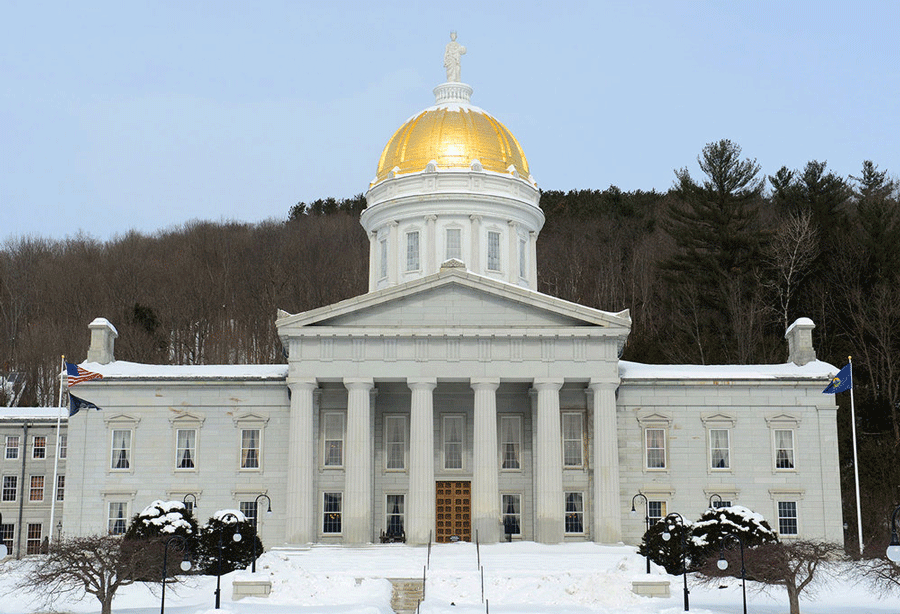New chancellor Zdatny heads push for bridge funding
the Golden Dome in Montpelier
After former VSCS Chancellor Jeb Spaulding’s proposal to close both campuses of NVU and the VTC-Randolph campus, a petition quickly arose calling for him to step down.
Less than a month later, Spaulding issued his formal resignation, and VSCS General Counsel Sophie Zdatny was asked to take his place as “interim interim Chancellor,” a title which indicated that the board of trustees was looking for somebody to take the position. In early June, Zdatny was named “Chancellor.”
Zdatny’s arrival comes at a pivotal point for the Vermont State Colleges System, as it awaits bridge funding from the Vermont Legislature to propel the system through enrollment and COVID-related deficits. “I sort of fell into the position,” she said. “I was asked to step in, so it wasn’t like I came in with a big vision.”
Zdatny has been charged with leading the way into a changed state college system, with four main directives from the VSCS Forward Task Force convened by the board of trustees during the summer. The recommendations include sharing operations between the Community Colleges of Vermont (CCV) and Vermont Technical College (VTC) campuses, creating a single General Education core, making VSCS offerings remotely accessible, and possible removal of program duplications between NVU and Castleton University.
The work to address program duplication is scheduled to be finished by the middle of October.
Johnson-based professors David McGough and Isaac Eddy will join Lyndon’s Janel Hanrahan and Alan Giese and NVU Provost Nolan Atkins in a negotiating team that will meet with representatives from Castleton. Since the onus of this work is on the professors, Zdatny’s focus has shifted to bridge funding.
“We had a lot of stakeholder input on the VSCS Forward process,” said Zdatny, “so we want to make sure that as we move forward, we are being transparent. There are a lot of moving parts and things are happening on parallel tracks.”
Zdatny added that many of the VSCS’ plans hinge upon receiving bridge funding to get through the year. “We exist for the benefit of Vermont,” she said, adding that the state is often directive in its desires for the state colleges, asking the VSCS to create majors or programs to fill areas of need in Vermont. “We’re hoping that they’ll tell us that piece if they’re going to invest in us.”
Zdatny was quoted in the Bennington Banner as having suggested “comparable action” to Spaulding’s plan to close campuses if bridge funding were not secured. “I was asked this question in three different legislative committees,” she said. “It was being asked in a friendly way, by people that support us. They want to make a point to their fellow legislators.”
Both Zdatny and Board of Trustees Chair Lynn Dickinson stressed that the VSCS is highly dependent on bridge funding, and that many plans are contingent upon the Legislature’s decision in September. “We aren’t making any contingency plans until we set our priorities,” Dickinson said.
“I firmly believe that we have a commitment from [the Legislature,]” said Zdatny. “We don’t have it written down yet, but I believe they will provide us with the bridge funding we need for this year. I don’t believe we will have to close things down.”
She added that she hopes the funding will provide the necessary resources to offer “the Gold Cadillac of public higher education” in Vermont.
In an interview with VPR in July, Zdatny affirmed her commitment to the campuses targeted by Spaulding’s proposal. “My personal view is I think we need to be present in Lyndon, Johnson and Randolph and we need to be providing education to students in each of those locations.”
Until bridge funding is secured, Zdatny is focusing on the task force convened by the Legislature and making sure stakeholders are heard.
“We have to keep things moving forward internally, because we can’t just sit back and do nothing,” she said.” We have to keep moving forward while also not getting ahead of the legislative select committee. We’re trying to do this in a public, collaborative way. I want to make sure people understand what we’re doing, why we’re doing it and that voices are getting heard.”
Zdatny acknowledged that a chancellor’s job is often invisible to students on campus. “I was just across the office from Jeb when he was the chancellor,” she said, “and I never was entirely sure what the chancellor did. Apparently what chancellors do is spend an enormous amount of time in meetings.”
Her days are filled with Zoom meetings, phone calls, and paperwork. “On average I have about six Zoom calls a day, then maybe phone calls and things like that,” she said. “Once the day gets going, from about 9:30 to 6:30, it’s pretty much back-to-back. If I have a little gap, a half an hour or so, it’s probably a phone call. Something’s always cropping up.”
She added that her schedule means she doesn’t get to check emails and do paperwork until evenings. “It’s been a challenge these past few months. Obviously, I’m new to the position, so I’m hoping we get into a rhythm at some point, where it doesn’t feel quite so reactive.”
Zdatny’s work as general counsel meant lots of writing, but her work now is mainly people-focused. “Being the chancellor means being the host of the meeting, and you have to stay very focused,” she said. “When I do meetings with other institutions of higher ed, I don’t have to be front and center. When you’re the center of attention, which is not naturally where I want to be, you’re performing.”
“I’m not a good juggler,” she said, laughing. “I have terrible hand-eye coordination. It’s a bit like those people that have the sticks with the plates on top—that’s about what it feels like.”
Despite the long hours and challenges, Zdatny feels positive about her work. “You don’t always know what you can do until you are asked to do it,” she said. “It’s been a learning experience. If you told me six months ago I’d be doing this, I’d have said, ‘No way.’ It’s certainly grown on me as I grow into the role.”

Senior, Journalism & Creative Writing
Grew up in Atkinson, NH
Fall 2018
Along with traditional journalism, I enjoy writing satire and fun feature...



